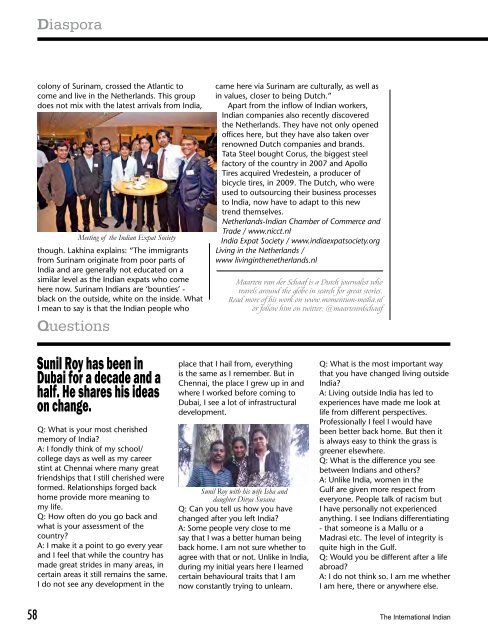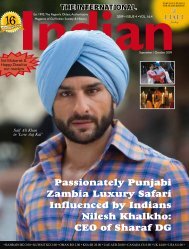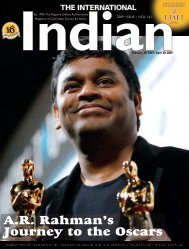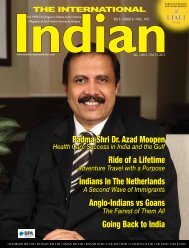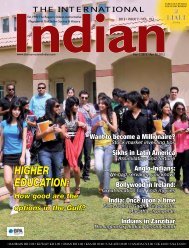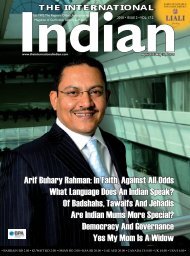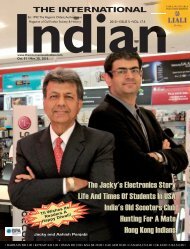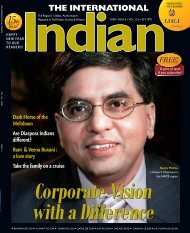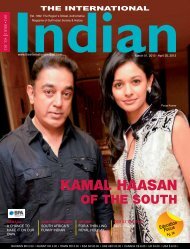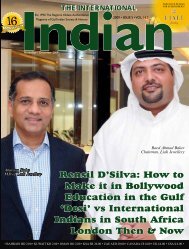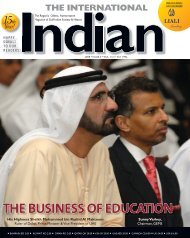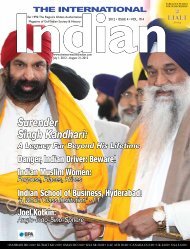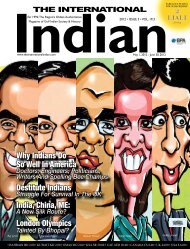Travel - International Indian
Travel - International Indian
Travel - International Indian
- No tags were found...
You also want an ePaper? Increase the reach of your titles
YUMPU automatically turns print PDFs into web optimized ePapers that Google loves.
Diasporacolony of Surinam, crossed the Atlantic tocome and live in the Netherlands. This groupdoes not mix with the latest arrivals from India,Meeting of the <strong>Indian</strong> Expat Societythough. Lakhina explains: “The immigrantsfrom Surinam originate from poor parts ofIndia and are generally not educated on asimilar level as the <strong>Indian</strong> expats who comehere now. Surinam <strong>Indian</strong>s are ‘bounties’ -black on the outside, white on the inside. WhatI mean to say is that the <strong>Indian</strong> people whoQuestionscame here via Surinam are culturally, as well asin values, closer to being Dutch.”Apart from the inflow of <strong>Indian</strong> workers,<strong>Indian</strong> companies also recently discoveredthe Netherlands. They have not only openedoffices here, but they have also taken overrenowned Dutch companies and brands.Tata Steel bought Corus, the biggest steelfactory of the country in 2007 and ApolloTires acquired Vredestein, a producer ofbicycle tires, in 2009. The Dutch, who wereused to outsourcing their business processesto India, now have to adapt to this newtrend themselves.Netherlands-<strong>Indian</strong> Chamber of Commerce andTrade / www.nicct.nlIndia Expat Society / www.indiaexpatsociety.orgLiving in the Netherlands /www livinginthenetherlands.nlMaarten van der Schaaf is a Dutch journalist whotravels around the globe in search for great stories.Read more of his work on www.momentum-media.nlor follow him on twitter: @maartenvdschaafSunil Roy has been inDubai for a decade and ahalf. He shares his ideason change.Q: What is your most cherishedmemory of India?A: I fondly think of my school/college days as well as my careerstint at Chennai where many greatfriendships that I still cherished wereformed. Relationships forged backhome provide more meaning tomy life.Q: How often do you go back andwhat is your assessment of thecountry?A: I make it a point to go every yearand I feel that while the country hasmade great strides in many areas, incertain areas it still remains the same.I do not see any development in theplace that I hail from, everythingis the same as I remember. But inChennai, the place I grew up in andwhere I worked before coming toDubai, I see a lot of infrastructuraldevelopment.Sunil Roy with his wife Isha anddaughter Divya SusanaQ: Can you tell us how you havechanged after you left India?A: Some people very close to mesay that I was a better human beingback home. I am not sure whether toagree with that or not. Unlike in India,during my initial years here I learnedcertain behavioural traits that I amnow constantly trying to unlearn.Q: What is the most important waythat you have changed living outsideIndia?A: Living outside India has led toexperiences have made me look atlife from different perspectives.Professionally I feel I would havebeen better back home. But then itis always easy to think the grass isgreener elsewhere.Q: What is the difference you seebetween <strong>Indian</strong>s and others?A: Unlike India, women in theGulf are given more respect fromeveryone. People talk of racism butI have personally not experiencedanything. I see <strong>Indian</strong>s differentiating- that someone is a Mallu or aMadrasi etc. The level of integrity isquite high in the Gulf.Q: Would you be different after a lifeabroad?A: I do not think so. I am me whetherI am here, there or anywhere else.58The <strong>International</strong> <strong>Indian</strong>


